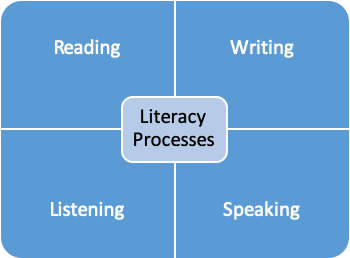The ability to read well opens the door to understanding God’s Word, world literature, the sciences, mathematics, history, social sciences, and every other area of study. Bender (2018) states, “We’re not born with the ability to read; we have to learn how to do it. We must move through a progression of steps that include learning how to recognize letters and sounds, decode words and ultimately figure out how to comprehend texts” (par. 2). But, what should my priorities be when choosing language arts materials for my students?
The following research-based practices are some of the essentials for any reading program:
Balanced Literacy
Look for a balance of reading, writing, listening, and speaking skills development. Provide the synergistic benefit of the four literacy processes that develop concomitantly.
Interest-Based Literature
Ensure a rich selection of literature from a variety of genres. Promote recreational reading to ensure that your students enjoy reading and develop reading fluency through interest-based reading selections. Ensure that students interact about text and ideas through the speaking and writing literacy processes. Interest, motivation (Christensen, Reschly and Wylie 2012) and time on task is key (Bridges 2015).
Vocabulary Development and Listening Comprehension
Expose your students to advanced vocabulary, and study Greek and Latin roots. Students can learn vocabulary through systematic instruction; however, they also learn vocabulary through conversations on a variety of topics at home and in the classroom (Lee 2020).
Educators should read advanced books aloud to students to raise their listening comprehension beyond their reading comprehension. Then, when students read text, they recognize the meaning of the words used and derive pleasure in understanding the passage they have just decoded. Advanced listening vocabulary undergirds reading vocabulary and activates background knowledge (Hogan, Adlof and Alonzo, 2014; Sedita 2016).
Catts, Hogan and Adlof (2005) confirm that word recognition and listening comprehension account for much of the variance in reading comprehension, regardless of grade. For all students, but especially those with reading disabilities, listening comprehension development is essential.
Diverse Cultural Contexts
 Expand your students’ global mindset, and expose them to diverse cultures and multiple perspectives: “Teachers who include texts and references to the specific cultures represented in the classroom [or neighborhood] are more likely to engage students, especially those who do not normally see their backgrounds reflected in mainstream instruction and texts” (McRae and Guthrie 2009, par. 9).
Expand your students’ global mindset, and expose them to diverse cultures and multiple perspectives: “Teachers who include texts and references to the specific cultures represented in the classroom [or neighborhood] are more likely to engage students, especially those who do not normally see their backgrounds reflected in mainstream instruction and texts” (McRae and Guthrie 2009, par. 9).
Material needs to be interesting and relevant for the reader. The text must make sense and connect to the students’ background knowledge: “When reading material is made relevant for students, they are more likely to become engaged and competent readers…When teachers encourage intrinsic motivation in students by making the reading activity in class relevant, students initiate and persist with the reading tasks” (McRae and Guthrie 2009, par. 1).
Diverse literature selections help prepare students for a global society. The varied content opens the eyes and hearts of children to those beyond their community’s sphere.
Decoding Skills
Ensure your program includes phonemic awareness skills, phonics skills (phoneme/grapheme relations), and study of base words and affixes to remove the mystery of unlocking the written word. Especially in the early stages of reading, students need explicit phonics instruction (Bales 2019; Lee 2020), along with fluency training—i.e., memorizing sight words, such as the Fry Word List (Bales 2019).
Fluency, Automaticity, and Efficiency
Memorizing sight words promotes reading fluency. The Fry Word List contains the thousand most frequently utilized words in English publications (Kress and Fry 2015; Bales 2019): “The first 25 words make up approximately one-third of all items published. The first 100 words comprise approximately one-third of all of the words found in publications. The first 300 words make up approximately 65% of all written material” (Kenton County School District 2020). Help your students automatically recognize the first 300 words in the early stages of reading.
Reading automaticity or “efficiency goes hand in glove with motivation and comprehension,” says Berkeley Professor Emeritus, Dr. P. David Pearson: “Readers need all three to be able to learn new ideas from the books they read. Think of it as a combination of skill, will, and thrill. Efficiency provides the skill, motivation engenders the will, and comprehension leads to the thrill of acquiring new ideas” (Bender 2018, par. 6).
Dr. Alexandra Spichtig, chief research officer for Reading Plus, has studied the effects of reading efficiency for more than a decade: “It is likely that the efficient reader experiences what I refer to as ‘readorphins.’ These are feelings of reading euphoria that are experienced by efficient readers because they read with ease and comfort. Since they are not distracted by the mechanics of reading, they are free to become fully absorbed in the books they read. Our research shows that students who become more absorbed in what they read report higher levels of confidence and motivation to read” (Bender 2018, par. 7).
Comprehension Skills
Reading comprehension builds on listening skills, decoding, automaticity, vocabulary, and background knowledge (Hogan, Adlof and Alonzo 2014). Working memory and attention are also essential. Comprehension strategies, such as the Think Aloud strategy, model what good readers do when they interact with text, helping children learn how to interact with text (Lee 2020).
Comprehension is the essential outcome as it relates to reading. Students learn, grow, exchange ideas (through writing and speaking), access the Word and the world, think critically, clarify their belief system, and change the world for Christ. Whichever language arts program you choose, make language arts fun, engaging, and meaningful through a balanced approach with the four literacy processes: reading, writing, listening, and speaking. Give your students the tools they need to be world changers.
[Note: While there are many research-based reading programs available on the market, the new Language Arts series, published by Purposeful Design Publications (PDP) includes all of the above research-based strategies. Each chapter in the Language Arts series weaves together the wonders of oral and written language along with a biblical worldview. Included in the series is comprehensive, research-based instruction in phonics, reading, vocabulary, spelling, literature, grammar, and writing. There are 12 decodable readers and 18 leveled readers provided for use in Kindergarten–Grade 2, as well as reader guides to accompany the leveled readers. The series also includes literature guides to promote comprehension, text-to-text and text-to-life connections, and an overall love of literature.]
References:
Bales, K. July 12, 2019. “What are Fry words?” ThoughtCo. Retrieved 2/15/20 from thoughtco.com.
Bender, R. October 15, 2018. “Efficiency, Motivation and Comprehension = the ‘Skill, Will and Thrill’ of Reading. Retrieved 2/9/20 from EdSurge.com.
Bridges, L. 2015. The Joy and Power of Reading: A Summary of Research and Expert Opinion. New York, NY: Scholastic.
Catts, W. W., T.P. Hogan, and S.M. Adlof. 2005. Developmental Changes in Reading and Reading Disabilities. In H.W. Catts and A.G. Kamhi (Eds.), The Connections Between Language and Reading Disabilities 25–40. Mahwah, NJ: Lawrence Erlbaum Associates.
Christensen, S., A. Reschly, and C. Wylie, Eds. 2012. Handbook of Research on Student Engagement. New York, NY: Springer Science.
Hogan, T.P., S.M. Adlof, and C.N. Alonzo. 2014. “On the Importance of Listening Comprehension.” International Journal of Speech Language Pathology 16 (3): 199–207.
Kenton County School District. 2020. “Fry Words: We’re building our sight word vocabulary.” Retrieved 2/15/20 from kenton.kyschools.us.
Kress, J. and E. Fry. 2015. The Reading Teacher’s Book of Lists (6th Edition). San Francisco, CA: Jossey-Bass.
Lee, A. 2020. “6 Essential Skills for Reading Comprehension.” Retrieved 2/15/20 from understood.org.
McRae, A. and J.T. Guthrie. 2009. “Promoting Reasons for Reading: Teacher Practices that Impact Motivation.” In E. H. Hiebert (Ed.), Reading More, Reading Better. New York: Guildford Press. Retrieved online 2/9/20 at readingrockets.org.
Sedita, J. 2016. “The Listening and Reading Comprehension Link.” Literacy Lines, retrieved 2/16/20 at keystoliteracy.com.
Wiser, B. September 2013. “Effective Vocabulary Instruction for Kindergarten to 12th-Grade Students Experiencing Learning Disabilities.” Retrieved 2/9/20 from Council for Learning Disabilities.
About the Author
 Dr. Hetzel specializes in literacy processes, curriculum development, and spiritual formation for teachers. A former public and private school teacher and administrator, as well as in-house editor, she has authored 18 teacher resource books, including Responding to Literature (1993; 2002). She also co-authored the text The Literacy Gaps (2009); edited eight levels of textbooks for English learners, entitled Passport to Adventure (2014); and co-edited Inclusive Classrooms for Community Flourishing (2018). She has written chapters for books and numerous articles for journals, including the Journal of Psychology and Theology, Evangelizing Today’s Child, the Home School Researcher, and Christian School Education. Dr. Hetzel has spoken for a variety of regional and international conferences, such as the Oxford Round Table, Oxford University; educational conferences in Chiang Mai, Thailand, and Jakarta, Indonesia; K–12 professional development in Taichung, Taiwan, and Washington, D.C.; and the ACSI regional administrators conference in Malta. She can be reached via email at june.hetzel@biola.edu.
Dr. Hetzel specializes in literacy processes, curriculum development, and spiritual formation for teachers. A former public and private school teacher and administrator, as well as in-house editor, she has authored 18 teacher resource books, including Responding to Literature (1993; 2002). She also co-authored the text The Literacy Gaps (2009); edited eight levels of textbooks for English learners, entitled Passport to Adventure (2014); and co-edited Inclusive Classrooms for Community Flourishing (2018). She has written chapters for books and numerous articles for journals, including the Journal of Psychology and Theology, Evangelizing Today’s Child, the Home School Researcher, and Christian School Education. Dr. Hetzel has spoken for a variety of regional and international conferences, such as the Oxford Round Table, Oxford University; educational conferences in Chiang Mai, Thailand, and Jakarta, Indonesia; K–12 professional development in Taichung, Taiwan, and Washington, D.C.; and the ACSI regional administrators conference in Malta. She can be reached via email at june.hetzel@biola.edu.

